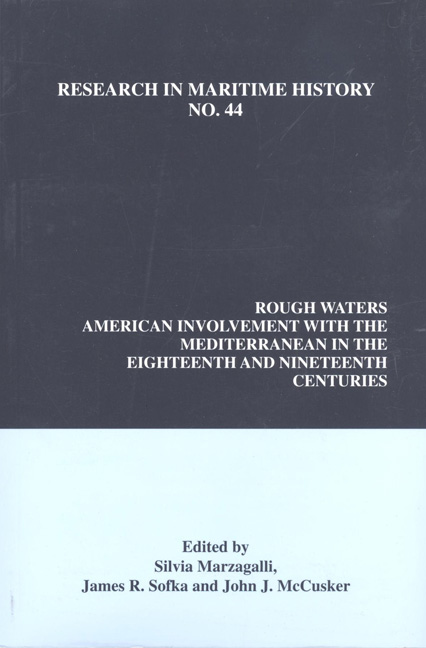Book contents
- Frontmatter
- Contents
- About the Editors
- Contributors' Notes
- “Rough Waters: American Involvement in the Mediterranean in the Eighteenth and Nineteenth Centuries: An Introduction”
- “Worth a War? The Importance of the Trade between British America and the Mediterranean”
- “Relations between North America and the Italian Peninsula, 1763-1799: Tuscany, Genoa and Naples”
- “American Shipping into the Mediterranean during the French Wars: A First Approach”
- “Notes toward a Franco-American Mediterranean 'From Below'”
- “Consuls and Consiglieri: United States Relations with the Italian States, 1790-1815”
- “Old and New Republics: Diplomatic Relations between the Republic of Genoa and the United States of America”
- ‘“From the Halls of Montesuma, to the Shores of Tripoli:’ Antoine Zuchet and the First Barbary War, 1801-1805”
- “Minorca: The First United States Naval Base in the Mediterranean and the American Consulate at Port Mahon”
- “‘The Jeffersonian Idea of National Security’ Revisited”
- “The Reluctant Warrior: Thomas Jefferson and the Tripolitan War, 1801-1805”
- “Slavery as Social Mobility? Western Slaves in Late Eighteenth Century Algiers”
- “Americans in the Mediterranean in the Late Eighteenth and Early Nineteenth Centuries: Concluding Remarks”
“Americans in the Mediterranean in the Late Eighteenth and Early Nineteenth Centuries: Concluding Remarks”
- Frontmatter
- Contents
- About the Editors
- Contributors' Notes
- “Rough Waters: American Involvement in the Mediterranean in the Eighteenth and Nineteenth Centuries: An Introduction”
- “Worth a War? The Importance of the Trade between British America and the Mediterranean”
- “Relations between North America and the Italian Peninsula, 1763-1799: Tuscany, Genoa and Naples”
- “American Shipping into the Mediterranean during the French Wars: A First Approach”
- “Notes toward a Franco-American Mediterranean 'From Below'”
- “Consuls and Consiglieri: United States Relations with the Italian States, 1790-1815”
- “Old and New Republics: Diplomatic Relations between the Republic of Genoa and the United States of America”
- ‘“From the Halls of Montesuma, to the Shores of Tripoli:’ Antoine Zuchet and the First Barbary War, 1801-1805”
- “Minorca: The First United States Naval Base in the Mediterranean and the American Consulate at Port Mahon”
- “‘The Jeffersonian Idea of National Security’ Revisited”
- “The Reluctant Warrior: Thomas Jefferson and the Tripolitan War, 1801-1805”
- “Slavery as Social Mobility? Western Slaves in Late Eighteenth Century Algiers”
- “Americans in the Mediterranean in the Late Eighteenth and Early Nineteenth Centuries: Concluding Remarks”
Summary
For over three centuries the Levant Company – aided by the British government – struggled to maintain and develop its monopoly over trade between Great Britain and the Ottoman Empire. In the late eighteenth and early nineteenth centuries, however, trade in the eastern Mediterranean was undergoing fundamental changes as a result of two prevailing forces: global economic growth and on-going European military conflicts. These two forces undermined the protectionist policies practised by Britain and France in trading with the region and opened markets and sea lanes to two neutral nations, the United States and the Ottoman Empire. It was not only governments in Washington, London or Paris, but the economic actors on the ground that, depending upon their interests, saw either new opportunities or unwarranted obstacles in these changing dynamics.
At home, the Levant Company was facing pressure in Parliament to relax its regulations, while in the Levant it was facing the growing threat of American commercial competition. On 15 January 1800 the British merchant community in Izmir through the British consul, Francis Werry, wrote to the Directors of the Levant Company in London that
in a General assembly held the 7th instant [this Factory] took under Consideration the Rate of duty that would be most advisable to levy on Merchandise imported to and exported from this Place in American Ships under British protection. After mature deliberation they are of the opinion as the Tariff of Duty levied…is upon as moderate a scale as any Nation established here and to avoid giving them an advantage over the Freemen of Your Company in their trade to and from this Place…the same rate of duty should be levied on Merchandize the property of Americans. By so doing they conceive no competition will arise from other Consuls.
In fact, the consul and the British merchant community in Izmir hoped that such “good treatment” on their part might make the Americans more inclined to send consignments to British houses rather than seeking agents among other European merchants or establishing their own trading houses. Dealing with the merchants from the new Republic, however, went beyond setting a competitive rate of duty.
- Type
- Chapter
- Information
- Rough WatersAmerican Involvement with the Mediterranean in the Eighteenth and Nineteenth Centuries, pp. 221 - 232Publisher: Liverpool University PressPrint publication year: 2010

